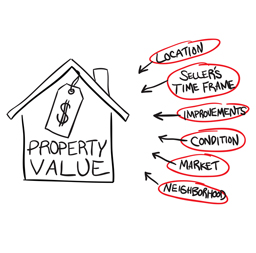Reasons why a home sale may fail
 There is an assortment of reasons why a home sale can fall through. Being proactive and seeing the signs in advance can help prevent disappointment from occurring. Anticipating issues and overcoming hurdles can mean the difference between sale success and failure.
There is an assortment of reasons why a home sale can fall through. Being proactive and seeing the signs in advance can help prevent disappointment from occurring. Anticipating issues and overcoming hurdles can mean the difference between sale success and failure.
Ultimately, nothing may be more disappointing than having a home sales transaction enter its final stages and fall through due to a technicality (no matter how small or large), an inspection discovery, unanticipated financing difficulty, low appraisals, and/or previously unforeseen buyer second thought.
Again, it is in a seller’s best interest to be aware of common, potential problems so that major deal breaking issues can be avoided altogether, or at the very least, are uncovered in advance so they do not become reasons leading to the termination of a transaction.
And as no surprise, a multitude of unforeseen things can happen during the escrow process. The following is a shortlist of potential issues that can be proactively addressed by the seller.
Buyer financing complications
During the height of the housing market heyday, buyers had little to no trouble qualifying for just about any size of loan. Today, rules and regulations have been tightened to dramatically increase the amount of credit and personal background history that must be evaluated and analyzed prior to a buyer qualifying for a home loan. It is certainly in the seller’s best interest to have their agent vet potential buyers for credit worthiness by making sure offers are from parties that have been preapproved for the appropriate amount of a required loan. Certainly, there are instances when a preapproved buyer may still not be approved to purchase a home if the sales price is far over their approved loan maximum. Again, this is why it is critical to do the homework. It may come to the point that a seller has no other options but to look for a competitive cash offer (perhaps below asking price). This is especially true if the house is being sold in a highly competitive market consisting of a multitude of comparable properties in a similar price range.
Troubling appraisals
If a seller prices a listing at a very aggressive price, there is always the chance that a financing institution will deny a loan if the appraisal comes back low. This causes obvious issues. If the buyer wants the property bad enough they may well try to convince the lender of the appropriateness of the sales price. Of course this is an uphill battle. Again, if the seller is trying to sell the property in a highly competitive market, it may be a good idea to limit deal-acceptance transactions to cash buyers and/or real estate investors – which undoubtedly will offer a lower sales amount. Ultimately, there are a few buyers you have enough cash on hand to add to the deal to assure a completed transaction occurs when the appraisal comes in low. More so than many other issues, a lower-than-expected appraisal can be a deal breaker. In these cases, sellers must be prepared to negotiate and rapidly lower / adjust the sales price if they want to close as soon as possible. In such cases, it may be in a seller’s best interest to offer to pay for a second appraisal – with the hope that the second impartial evaluator submits a higher value.
Plan and prepare for title and home inspection issues
It may just be Murphy’s Law that if a seller is in need of a timely, sale there maybe some title and/or home inspection issues with the property. Do the due diligence in advance. Take a trip to the county recorders office or access the appropriate website to make sure that the home is free and clear of any potential liability or legal issues. In addition, pay for your own pest and home inspection to assure that there are not any deal-breaking interior or exterior issues before the sales transaction process gets underway and the buyer exercises their right to back out.
Be picky when scrutinizing offers
Though the goal of attracting an aggressive offer from a cash buyer may ultimately become unattainable, it may be in a seller’s best interest to avoid selling to a buyer in a highly leveraged, contingency purchase transaction. Many buyers need all of the the equity in their current homes to purchase a new one; and if the buyer’s home sale falls through, they will most assuredly have to pull out of the seller’s home sale as well – leaving the seller having to start over. As long as there is not a historically competitive buyer’s market, the seller may find a solution to this problem rather straightforward. Do not accept an offer from a buyer who has a contingency on their own sale. Instead, only accept offers from buyers who have already sold their homes and do not need to rely on any other forms of financing to enter into a new transaction.